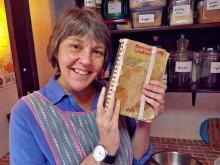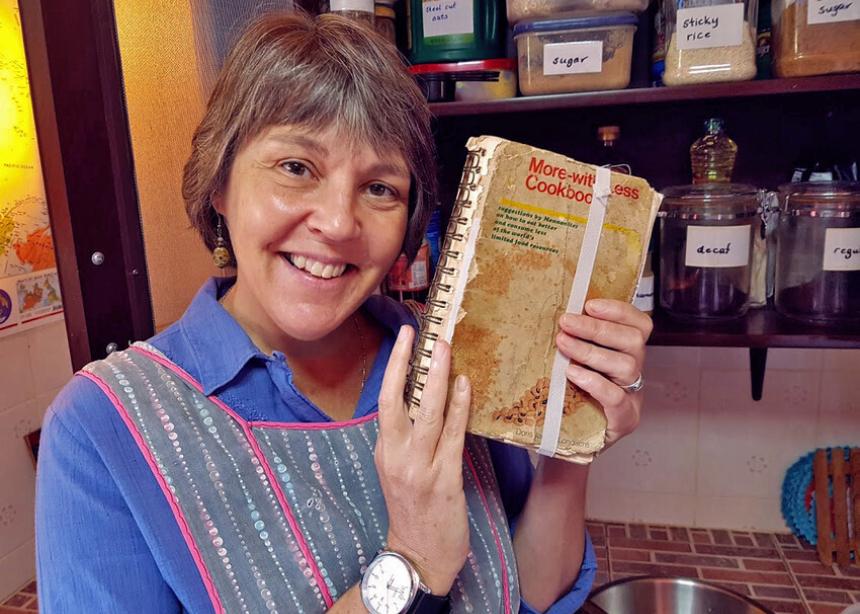A reader of this magazine thinks we have got our name backwards. He thinks the name should be Mennonite Canadian. “You are Canadian,” he says emphatically. “You think you are different from other Canadians because you call yourselves Mennonite, but you are not.” The man raises an interesting question. In what ways are we Mennonites different from other Canadians?
In Waterloo, where this magazine is headquartered, there is a visible minority of Mennonites who wear plain clothes and drive horses and buggies. Their values clearly set them apart from secular society. What about the rest of us? Our houses, cars and clothes look similar to those of our neighbours. Are the differences between our branch of Mennonites and the rest of Canadian society all in our heads?
Another reader raised a similar issue when he had newly joined the Mennonite church. “When I meet the people in your churches, I can’t see what is distinctive about you,” he said. The man grew up in another country and became Mennonite while studying theology in seminary. After moving to Canada, he experienced a new culture both inside and outside the church and he could not see a difference. “Write articles that show newer Mennonites what you believe,” he suggested.
CM’s content gives a window into what Mennonites believe, but perhaps we are too subtle in connecting the stories to our faith. Perhaps the same can be said for “modern” Mennonites in daily life.
Mennonites often say that we show what we believe through our daily lives. We show faith in action: loving our neighbours, rejecting violence, supporting each other in the church community, working for justice. If these values are not visible to some people who attend our churches, they must be even less apparent to the outside world.
There are at least two other faith-based values that Mennonites have long emphasized: service towards others and resisting the materialism that surrounds us in society. In both cases, our ethic is to follow Jesus’ model of servanthood, placing the needs of others before our own.
We are called to share our resources with others, knowing that we have more than we need. We used to call it “simple living.” The 1976 More-with-Less Cookbook by Doris Janzen Longacre was countercultural and had a generation-long impact on Mennonite lifestyle and food choices. Do we emphasize these values today?
These days, much church attention is given to climate justice. Recommended actions are like suggestions made by Longacre 45 years ago, but they have become mainstream. Both church and secular conversations are about harm reduction to the planet. In church, do we connect the concepts back to the underlying challenge to resist consumerism as a whole?
This issue carries our annual Focus on Money. The feature article by fundraising consultant Jon Brandt observes that congregational giving patterns have changed in a generation. To allow our church organizations to succeed, we need to adapt our attitudes towards how we fund these larger church bodies.
As well, this issue has articles about what to do with our abundance (ethical investing, responsible banking, generosity) but very little about adopting a simple lifestyle. In his column “What is enough?” Randy Haluza-DeLay refers to a 2005 article about simple living that had a long-term impact on him. He writes, “living simply is act of discipleship and a witness to higher values, as well as encouraging generosity, demonstrating alternatives and fostering sustainability.”
The values of simple living and sharing resources with others remain valid today. Here’s a call to strengthen our storytelling so that newcomers to our churches and neighbours on the street will see our faith through our use of money. In doing so, we may distinguish ourselves from other Canadians and perhaps—just like the ideas in the More-with-Less Cookbook—our 21st century Mennonite values will become mainstream.
Farewell
With this issue, we say goodbye to Joanne De Jong, who has been correspondent for Alberta since June 2019. She’s written about the people and congregations of that province—their joys, challenges and contributions. Joanne has a passion for intercultural relationships, which was evident in her writing. We thank her for all her contributions.
This fall, Joanne and her husband Werner are heading to Ethiopia, as workers with MC Canada’s International Witness. They will serve as relief faculty at Meserete Kristos College. Our prayers go with them.
—Virginia A. Hostetler
Read more editorials:
Peace on the screen
Moving toward normal
Onscreen adventures
Behind the scenes
Smile!

Jeanne Zimmerly Jantzi—pictured in 2016, when she was living in Chiang Mai, Thailand and serving as MCC area director for Southeast Asia—holds her original copy of 'More-with-Less.' She has been using the cookbook wherever she has lived in the world ever since it was released in 1976. (MCC photo by Dan Jantzi)




Comments
MC Canada members having been fully assimilated to the Canadian good life must find tokens of identity.
More with Less has become just that. A token of a long lost Christian identity that sought to live a simple life in the presence of God and fellow believers.
Unfortunately, cooking with More with Less (which i recommend) is not a missiological thrust that has had any evidence of successfully winning Canadians to Christ.
World Peace Day Sept 21
It seems like the values needed for world peace, for less violence in the world in general, whether a person on person violence, nation on nation, or person on environment violence, are all furthered to some extent by some such motto like "More with Less" applied to all facets of our lives. This seems like something Jesus would do, and something Jesus indicated disciples should do as indicated by the "Great Commission." Seems like Jesus was non-violent in word and deed, although perhaps his actions/ministrations too were token in nature.
To my mind the violence of the missiological interpretation of the Great Commission, imposing Christianity on non-Christian peoples and naming it as "winning people to Christ," is the kind of Pharisaical religiosity Jesus was trying to get away from.
These are however the differences and "values that set us apart," requiring creative reimagination to further the unity and world peace Jesus inspired us to strive for.
Add new comment
Canadian Mennonite invites comments and encourages constructive discussion about our content. Actual full names (first and last) are required. Comments are moderated and may be edited. They will not appear online until approved and will be posted during business hours. Some comments may be reproduced in print.